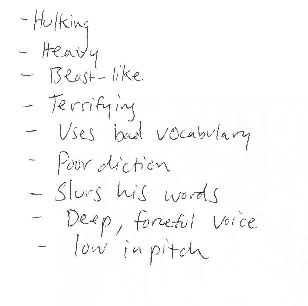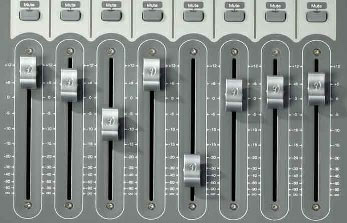Stay Up To Date With Us!
We will never spam you or share your email address.
Game Sound Design Strategies
GSD StrategiesCheck out the gamesounddesign.com strategies when you are feeling creatively uninspired. Each random strategy will present you with a new avenue to pursue. Give them a try!
Game Sound Design Glossary
GSD GlossaryOur game audio glossary has all the sound terms you have been wondering about. Game audio can be confusing enough without having to deal with a new technical language. We are constantly updating the database with new terms that relate to not only game audio but game developer terms as well.
Voice Acting - How To Effectively Direct Actors
Article by George Spanos
Voice direction is definitely not a task for the under-prepared. It requires a lot of patience, empathy, and as much experience as possible to get it right. Some of the best voice directors out there, be it for film, television, or games, possess a firm grasp of the techniques and toolset that are required to communicate effectively with actors. Quite often voice directors are under a lot of pressure to coax the best performance possible out of the talent in the recording booth. After all, top notch talent can be very expensive. Add to this the cost of the recording studio and staff like engineers and assistants and you can wind up with a very expensive bill at the end of the day.
In order to compete with major hollywood films it is imperative that video games employ well written and detailed voices. Gamers demand it. Just like gamers demand a superior surround sound immersive gaming experience, the voice acting in today's games is of the utmost importance.
In addition to this, video games are increasingly featuring well known and sought after actors to play lead voice roles. And for good reason too. Not only can these actors deliver a familiar voice but they also sell more games. Publishers are realizing that employing a famous actor in their game may very well sell many additional copies just on the weight of the actor's name.
So what are some of the best techniques and tools out there that can help to you achieve a winning performance? In this article I'll let you in on over 10 years of experience in the studio. I've recorded probably close to 700 unique actors as well as had my fair share in directing sessions and casting auditions. Even if you are not the one that will be directing the talent for your studio's next project the guidelines below will definitely help you to get a leg up on the often hidden world of voice direction. Read on!
Do Your Homework

Before the session even starts and before the recording studio has been booked it is vital that you have a firm and thorough understanding of what you hope to hear from your actor. Think about what the character you will be creating should sound like. What is the general mood and emotion that the character needs to convey? This may seem obvious but is often overlooked at this preliminary stage. Review the character art concepts and start jotting down words that immediately come to mind when looking at the character.
Another helpful tool is to also write down the names of characters from other games or movies that you wish your character to sound like. Think of common stereotypes in popular culture that come to mind when looking at your character. Does your character need to portray a tough emotionally detached hero like Marcus Phoenix in Gears of War or like Bruce Willis' John McClane in the Die Hard series? Conversely is your character the humorous jokester like Adam Sandlers' Happy Gilmore. Thinking about character stereotypes in this fashion will help you when recommendations and character bios are provided to the casting director (which they should be!).
The Casting Director

In order to choose the best voice talent for your video game it is important to hire a competent casting director. This person will cull together voice actors from many different agencies and will hold an audition recording session. A few lines from the script will be recorded so that you may be able to judge the sound and acting quality of the actor. Make sure that you provide the casting director with a brief synopsis about your character's background, attitude, and any stereotypical references that you have previously thought of. Now this is not to say that your references should be followed to a "T" but they will provide a good indication of what type of character voice you are hoping will come across.
At this stage it is not imperative for you to listen in on the sessions. The casting director will most likely provide you with a minimum of five voice options to choose from, maybe even a lot more given the importance of the specific character. Lead characters and characters that are vital to the story line should be picked with care and the more actors that are auditioned means the greater talent pool from which to pick from.
Sometimes you will be provided with a demo reel with which to make your final character selections. If at all possible DO NOT use demo reels to base your decisions on character voice selection. It is important to base character selection on a casting session where the potential actors get into character and read parts of your script. Demo reels are great for doing a preliminary listen through to determine the actor's capabilities and to determine who should be brought in to the casting session.
The Voice Auditions
When the auditions are over it is time to listen to all of the actors' demos. Make yourself a spreadsheet with each of the actors' names and a ranking system. As you listen through the auditions consider ranking each actor based on how close to the mark they are able to perform your desired character. Listen for proper intonation, inflection and accent (if necessary). But most of all listen for believability. When you close your eyes and listen to the actor do you believe what they're saying and the character that is being portrayed? Does the emotion come through in their interpretation? At this stage it is not terribly important for the read to be impeccable, you will work on that in the actual session. It is imperative though, that the vibe is there and that you think that the character you want can be easily obtained with the most minimal of effort in the final recording session.
The Recording Session
Once you have made your final character selections based on the voice auditions, it is time to get prepared for the recording session. If you will be hiring a voice director then he or she will help guide you through the process and will navigate the session. It is highly recommended for the developers who are responsible for the voice implementation to be at the session. After all, you know what you want to hear from the actor and should be available for any last minute script change approvals.
If it is not feasible for any developers to physically be at the recording session then setting up some sort of voice patch to the recording studio should be prepared ahead of time. There are many solutions out there including ISDN and Voice Over Internet Protocol such as the Source Connect software plugins. Not having any developers physically at the session or listening in remotely is not advisable as you will not be able to make comments about the performances, which can definitely hurt you later. However, it is important to remember that only those members from the development team that have a vested creative interest be involved in the session. You don't need 10 different opinions on the actor's read. Too many sessions are slowed down because there are too many cooks in the kitchen.
Final line timings should be given to the voice director ahead of time along with character references. A wise decision is to talk to the voice director before the session to brief him or her on what type of read you are expecting from your actors. Provide the voice director with your character stereotypes, artwork, and the selected demo reads. A good voice director will be able to absorb all of this information and come up with a game plan for how to achieve the desired voice recordings.
Voice directing is definitely part science, art, psychology, and experience. It takes many years of hard work to perfect a technique that will enable you to direct actors with consistent success. There are a few tips that are good to know, and I've outlined them here:
1. Hear what you want the read to sound like in your head before the session. If you can hear what you want the end voice to sound like before the recording starts you will have a foundation of how to direct the actor when you're in the hot seat.
2. Before the actor goes into the booth give him or her a run-down of what the character type is. If possible show the actor what the character looks like so that they can get a proper visualization and feel for the stature of the character they have to become.
3. Between takes don't provide too much information all at once. Actors are people too and work better when given only the information they absolutely need to know. Before getting on the talkback microphone with your comments about their take, think about what you want to get across. Give the actor a clear and precise critique in as short a comment as possible. Be very specific. This is probably the hardest task to master and only really comes with experience, but keep it in mind.
4. Think of character examples to give to your actor if they are "not getting it". Remember those character stereotypes that were mentioned earlier? This is a good place to have them available for your reference.
5. Avoid reading the lines for the actor. By reading the line to them you are "feeding" them the direction and many actors don't appreciate this. Instead, critique their performance in a non threatening way and with useful and short information.
6. Don't let anxiety get the better of you. If the actor is not providing you with the read you are hoping for think of alternate directions to take. An effective way of doing this is to provide context from everyday life. Make an analogy to a common event such as "You're speaking to your warriors and want them to obey you... think of how you would tell the dog to stop chewing on your shoes". It may seem funny but context is everything and it can help.
7. Run a stop watch on each take if timing is critical. This will help you to get an idea of how fast the read needs to be to accommodate your specific requirements.
8. Get multiple usable takes for variation. These days AAA games are expected to have multiple variations of words and lines that are going to be played often during the course of gameplay. It is essential to get multiple takes.
9. It is also essential to get variations on common occurances such as deaths, pain, and exertions. Pay special attention to recording lines that you think you may need just in case. Better to have them in the can then wish you had recorded them!
After The Session

Once the recording is done the takes can be delivered from the studio to you for implementation into the game. At this point it is wise to take a quick listen to what you've got and determine if you might need a pickup session later on. Chances are you will. Because video games can change direction radically during the final phases of production it is quite possible that you will need your characters to speak additional lines. There may even be new character additions that will need to be recorded.
Voice direction is a niche that takes many years to perfect. If the development studio or publisher can afford it, hire an experienced voice director. Trust in their expertise and if you follow the aforementioned tips you will be better equipped to talk to both the voice director and the talent.

